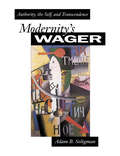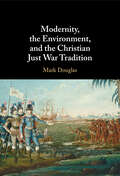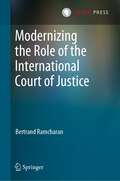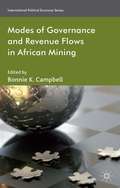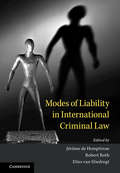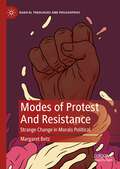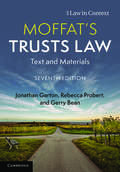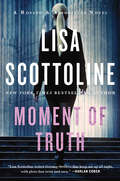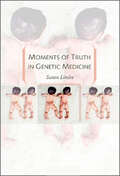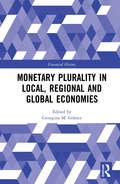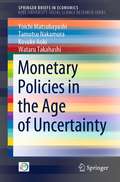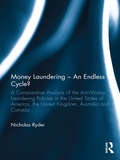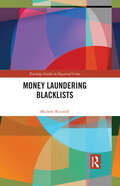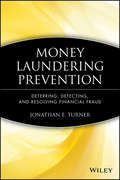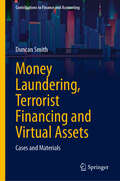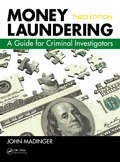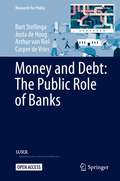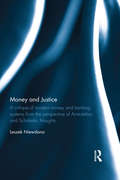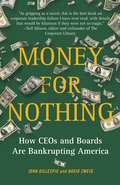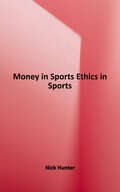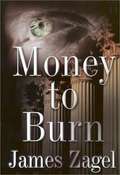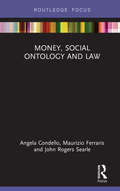- Table View
- List View
Modernity's Wager: Authority, the Self, and Transcendence
by Adam B. SeligmanAdam Seligman, one of our most important social thinkers, continues the incisive critique of modernity he began in his previously acclaimed The Idea of Civil Society and The Problem of Trust. In this provocative new work of social philosophy, Seligman evaluates modernity's wager, namely, the gambit to liberate the modern individual from external social and religious norms by supplanting them with the rational self as its own moral authority. Yet far from ensuring the freedom of the individual, Seligman argues, "the fundamentalist doctrine of enlightened reason has called into being its own nemesis" in the forms of ethnic, racial, and identity politics. Seligman counters that the modern human must recover a notion of authority that is essentially transcendent, but which extends tolerance to those of other--or no--faiths. Through its denial of an authority rooted in an experience of transcendence, modernity fails to account for individual and collective moral action. First, deprived of a sacred source of the self, depictions of moral action are reduced to motives of self interest. Second, dismissing the sacred leaves the resurgence of religious movements unexplained. In this rigorous and imaginative study, Seligman seeks to discover a durable source of moral authority in a liberalized world. His study of shame, pride, collective guilt, and collective responsibility demonstrates the mutual relationship between individual responsibility and communal authority. Furthermore, Seligman restores the indispensable role of religious traditions--as well as the features of those traditions that enhance, rather than denigrate, tolerance. Sociologists, political theorists, moral philosophers, and intellectual historians will find Seligman's thesis enlightening, as will anyone concerned with the ethical and religious foundations of a tolerant society.
Modernity, the Environment, and the Christian Just War Tradition
by Mark DouglasIn this volume, Mark Douglas presents an environmental history of the Christian just war tradition. Focusing on the transition from its late medieval into its early modern form, he explores the role the tradition has played in conditioning modernity and generating modernity's blindness to interactions between 'the natural' and 'the political.' Douglas criticizes problematic myths that have driven conventional narratives about the history of the tradition and suggests a revised approach that better accounts for the evolution of that tradition through time. Along the way, he provides new interpretations of works by Francisco de Vitoria and Hugo Grotius, and, provocatively, the Constitution of the United States of America. Sitting at the intersection of just war thinking, environmental history, and theological ethics, Douglas's book serves as a timely guide for responses to wars in a warming world as they increasingly revolve around the flashpoints of religion, resources, and refugees.
Modernizing the Role of the International Court of Justice
by Bertrand RamcharanThis book discusses the future role of the International Court of Justice (ICJ) in a world facing survival challenges. It discusses threats such as climate change, environmental degradation and pandemics, and argues that in the future the ICJ will need to carry out judicial, security and protection functions as it is the only organ of the United Nations (UN) that can discharge such functions in view of its independence and expertise. The author proposes that the ICJ can apply a hitherto unused jurisdictional provision in Article 36 of its statute that allows it to deal with "All Matters Specially Provided for in the UN Charter" and presents three examples of issues that would require the urgent attention of the ICJ: vaccine equity in a global pandemic, climate disaster, and mass movements of people across frontiers due to climate change and environmental degradation. Bertrand Ramcharan (Guyana) is a Barrister-at-Law of Lincoln’s Inn with a Doctorate in international law from the London School of Economics (LSE) and the Diploma in International Law of the Hague Academy of International Law. He was LSE International Law Scholar and has been Commissioner of the International Commission of Jurists and a Member of the Permanent Court of Arbitration. He has also been Director of the Research Centre of the Hague Academy of International Law (The Right to Life), Professor at the Geneva Graduate Institute, and Chancellor of the University of Guyana. He is a former Chief speech-writer of the UN Secretary-General, and has performed the functions of UN High Commissioner for Human Rights. His doctoral thesis was on the approach of the International Law Commission to the codification and progressive development of international law.
Modes Of Governance And Revenue Flows In African Mining
by Bonnie K. CampbellAcademics, policy-makers and practitioners from Africa and beyond document new ways of thinking about issues concerning governance and revenue flows in mining activities in Ghana, Mali and the Democratic Republic of the Congo.
Modes of Liability in International Criminal Law
by Robert Roth Elies Van Sliedregt Jérôme De Hemptinne Tom Gal Dillon Roseen Thomas Van PoeckePresently, many of the greatest debates and controversies in international criminal law concern modes of liability for international crimes. The state of the law is unclear, to the detriment of accountability for major crimes and of the uniformity of international criminal law. The present book aims at clarifying the state of the law and provides a thorough analysis of the jurisprudence of international courts and tribunals, as well as of the debates and the questions these debates have left open. Renowned international criminal law scholars analyze, in discrete chapters, the modes of liability one by one; for each mode they identify the main trends in the jurisprudence and the main points of controversy. An introduction addresses the cross-cutting issues, and a conclusion anticipates possible evolutions that we may see in the future. The research on which this book is based was undertaken with the Geneva Academy.
Modes of Protest And Resistance: Strange Change in Morals Political (Radical Theologies and Philosophies)
by Margaret BetzThis book presents a philosophical analysis of the different forms of political resistance and protest. It explores the normative space of resistance that is beyond self-defense and civil disobedience, and proposes the concept of “resistance violence” as a separate and special normative category. Instances that fall under this category can be, accordingly justified, even if they prove to be practically ineffective, by appealing to their role in preserving or upholding the dignity of the resistors or those who they aim to protect. Margaret Betz draws from important and interesting historical examples to establish the concept, and proposes to apply it to better understand contemporary struggles against injustice.
Moffat's Trusts Law: Text and Materials (Law in Context)
by Graham Moffat Gerry Bean Rebecca Probert Jonathan GartonThis latest edition of Moffat's Trusts Law has been fully revised and updated to cover recent statutory developments and explores the impact of a wealth of new cases including the Supreme Court decisions in Pitt v. Holt (2013), FHR European Ventures v. Cedar Capital Partners (2014) and Williams v. Central Bank of Nigeria (2014). It has been restructured to incorporate a new chapter on the internationalisation of the trust which provides an understanding of the new directions being taken in the areas of trust law and equitable remedies. Supplementary material includes an online chapter on occupational pension schemes. With suggestions for further reading guiding the student to contemporary debates, this leading textbook retains its hallmark combination of a contextualized approach and a commercial focus, and remains the serious student's textbook of choice. The book utilises a range of teaching methods, including identifying key 'points to consider', use of visual aids and discussion questions. Restructured to include a new chapter on internationalisation of the trust and an online chapter on occupational pension schemes. Retains its hallmark combination of a contextualized approach and a commercial focus.
Moffat's Trusts Law: Text and Materials (Law in Context)
by Gerry Bean Rebecca Probert Jonathan GartonAlways the serious student's choice for a Trusts Law textbook, the new seventh edition of Moffat's Trusts Law once again provides a clear examination of the rules of Trusts, retaining its hallmark combination of a contextualised approach and a commercial focus. The impact of statutory developments and a wealth of new cases – including the Supreme Court and Privy Council decisions in Patel v. Mirza [2016] UKSC 42, PJS v. News Group Newspapers Ltd [2016] UKSC, Burnden Holdings v. Fielding [2018] UKSC 14, and Federal Republic of Brazil v. Durant [2015] UKPC 35 – are explored. A streamlining of the chapters on charitable Trusts, better to align the book with the typical Trusts Law course, helps students understand the new directions being taken in the areas of Trust Law and equitable remedies.
Mom's Guide to Wills and Estate Planning, The
by Liza Hanks AttorneyEstate planning basics to help you protect your young family. You know that now is the time to do something in the way of estate planning to provide for your young children -- but what, exactly? Is a will all you need? What about life insurance or a living trust? And how much will it all cost? The Mom's Guide to Wills & Estate Planning gives you practical, straightforward recommendations on estate planning options and provides a solid plan that every family can find the time to follow -- without the expense of hiring an attorney. This book outlines which proactive steps are most crucial and should be taken immediately, and which can be delayed. Focusing on your family's real-world concerns, you'll find out: how to select a guardian for children when to consider a living trust how to set up payable-on-death accounts vhow to keep your estate plan current You'll also see handy and relevant USA TODAY snapshots, infographics and insights throughout The Mom's Guide to Wills & Estate Planning. So what are you waiting for? Create an estate plan to protect your young children today.
Moment of Truth (Rosato and Associates #7)
by Lisa ScottolineWhen attorney Jack Newlin discovers his wife dead in their home, he's convinced he knows who killed her--and is equally determined to hide the truth. He decides to frame himself for murder, and to seal his fate he hires the most inexperienced lawyer he can find: a reluctant rookie by the name of Mary DiNunzio from the hot Philadelphia firm of Rosato & Associates. But hiring Mary may turn out to be his biggest mistake. She doubts Jack's confession, and her ethics and instincts tell her she can't defend a man who wants to convict himself. Smarter, gutsier, and more persistent than she has any right to be, Mary sets out to prove what really happened--because, as any lawyer knows, a case is never as simple as it seems. And nothing is ever certain until the final moment of truth.
Moments of Truth in Genetic Medicine
by M. Susan LindeeGenetic research increasingly dominates medical thought and practice in the United States and in many other industrialized nations. Susan Lindee's original study explores the institutions, disciplines, and ideas that initiated the reconfiguration of genetic medicine from a marginal field in the mid-1950s to a core research frontier of biomedicine. Tracing the work of geneticists and other experts in identifying and classifying disease during the explosive period between 1950 and 1980, Lindee identifies the individual "moments of truth" that moved the field away from its eugenic past to the center of a new world view in which nearly all disease is understood to be fundamentally genetic. She suggests that these moments of truth were experienced not only by scientists but also by those who had familial, intimate, emotional knowledge of hereditary disease: patients, family members, and research subjects. Focusing on benchmarks in the field—such as the rise of neonatal testing in the 1960s, genetic studies of unique human populations such as the Amish, the development of human cytogenetics and human behavioral genetics, and the efforts to find genes for rare diseases such as familial dysautonomia—she tracks the emergence of a biomedical consensus that nearly all disease is genetic disease. Using the success of this field as a point of entry, Lindee chronicles both the production of knowledge in biomedicine and changes in the cultural meaning of the body in the late twentieth century. She suggests that scientific knowledge is a community project that is shaped directly by people in many different social and professional locations. The power to experience and report scientific truth may be much more dispersed than it sometimes appears, because people know things about their own bodies, and their knowledge has often been incorporated into the technical infrastructure of genomic medicine. Lindee's pathbreaking study shows the interdependence of technical and social parameters in contemporary biomedicine.
Monetary Plurality in Local, Regional and Global Economies (Financial History)
by Georgina M. GómezThe idea that each country should have one currency is so deeply rooted in people’s minds that the possibility of multiple and concurrent currencies seems unthinkable. Monetary systems contribute to problems of high unemployment and social distress during financial and economic crisis, so reforms to increase the responsiveness and flexibility of the monetary system can be part of the solution. This book discusses ‘monetary plurality’, which is the circulation of several currencies at the same time and space. It addresses how multiple currency circuits work together and transform socio-economic systems, particularly by supporting economies at the local level of regions and cities. The book shows that monetary plurality has been ubiquitous throughout history and persists at present because the existence of several currency circuits facilitates small-scale production and trade in a way that no single currency can accomplish on its own. Monetary plurality can improve resilience, access to livelihoods and economic sustainability. At the same time, it introduces new risks in terms of economic governance, so it needs to be properly understood. The book analyses experiences of monetary plurality in Europe, Japan, and North and South America, written by researchers from East and West and from the global North and South. Replete with case studies, this book will prove a valuable addition to any student or practitioner’s bookshelf.
Monetary Policies in the Age of Uncertainty (SpringerBriefs in Economics)
by Tamotsu Nakamura Yoichi Matsubayashi Kosuke Aoki Wataru TakahashiThis book provides an interesting review of Japanese monetary policies after the bubble economy. The Bank of Japan was the first central bank in advanced economies to implement the unconventional monetary policies during the period. After the Lehman shock, most advanced economies also carried out similar monetary policies to boost their own economies. The Japanese experience in the 1990s and 2000s no doubt played a key role during the period. Although various aspects of the experiences have been examined, not many books have been published based on intensive discussions between the macro and monetary theorists who have been active in academics and the practitioners who have actually been involved in monetary policy. This small but important book has focused on the Japanese experience. Evaluation of that experience found that three solid pillars are of crucial importance: theory, institution, and experience. Those form the basis of the book, without theory, no policies will be formulated and implemented, and implementation depends crucially on institution. Chapter 1 provides a clear theoretical background for the unconventional monetary policies and inflation targeting. Chapter 2 intensively explores the meaning and desirability of the independence of central banks. Chapter 3 reviews the consequences of the Japanese monetary policies in recent decades in comparison with those in other advanced economies.
Money Laundering - An Endless Cycle?: A Comparative Analysis of the Anti-Money Laundering Policies in the United States of America, the United Kingdom, Australia and Canada (The Law of Financial Crime)
by Nicholas RyderThis book provides a detailed examination of anti-money laundering policies and legislative frameworks in a number of jurisdictions and considers how successful these jurisdictions have been in implementing international measures to combat money laundering. Looking at the instruments and proposals put in place by a number of institutions including the United Nations (UN), the Financial Action Task Force (FATF) and the European Union, the book begins by reclassifying and expanding the traditional global anti-laundering policy to include aspects such as having a national money laundering strategy in place, the implementation of international instruments and the role of government and regulatory agencies. Ryder then offers a comparative analytical review of the anti-money laundering policies adopted in the United States of America, Canada, the United Kingdom and Australia and considers to what extent they have followed and implemented the identified global anti-money laundering policy. Money Laundering – An Endless Cycle? will be of particular interest to academics and students in the fields of Law, Finance, Banking and Criminology.
Money Laundering Blacklists (Routledge Studies in Organised Crime)
by Michele RiccardiWhat are the criteria used by Financial Action Task Force (FATF) and the European Union to blacklist jurisdictions at high-risk of money laundering? What are the countries at highest risk according to Panama Papers and FinCEN files? Where do criminals move their illicit money, according to judicial and investigative evidence? This book answers these questions. It is an unprecedented study on the countries at highest risk of attracting money laundering and organised crime proceeds – and how they are identified as such by scholars, policy-makers and anti-money laundering (AML) practitioners. It targets an issue which is central to the policy debate, in the media, but is under-studied. This book is divided into two parts. Part I discusses the concept of money laundering risk, its main determinants, and carries out a review of extant country ratings, ranging from official blacklists and grey lists, to media leaks and scholarly papers. Part II discusses the weaknesses and the myths behind the current ratings and proposes a new approach to assess the risk of money laundering across countries. With a critical research perspective, empirically driven, this book aims to satisfy both scholars and students – in particular from criminology, economics, and international relations – and practitioners from banks, professional firms, and AML authorities.
Money Laundering Prevention
by Jonathan E. TurnerA how-to guide for the discovery and prevention of the illegal transfer of moneyWritten for the private sector--where most money laundering takes place--this book clearly explains shows business professionals how to deter, detect, and resolve financial fraud cases internally. It expertly provides an understanding of the mechanisms, tools to detect issues, and action lists to recover hidden funds.Provides action-oriented material that will show how to deter, detect, and resolve financial fraud casesOffers an understanding of the mechanisms, tools to detect issues, and action list to recover hidden fundsCovers mechanisms for moving money, identifying risk exposures, and investigating money movementArming auditors, investigators, and compliance personnel with the guidance that, up until now, has been restricted to criminal investigators, Money Laundering Prevention provides nuts-and-bolts information needed to fully understand the money laundering process.
Money Laundering, Terrorist Financing and Virtual Assets: Cases and Materials (Contributions to Finance and Accounting)
by Duncan SmithThis book presents case studies on financial crime, focusing on money laundering and terrorism finance. It includes real life examples to identify the characteristics of these crimes and discusses possible national and international measures to prevent it. The book is divided into three sections. The first part of the book reviews international and national approaches and responses to the problems. The second part includes case summaries involving money laundering, terrorist financing or economic crime involving cryptocurrency in a range of countries. The third part of the book focuses on legal frameworks to prevent money laundering, terrorist financing and misuse of virtual assets and includes materials from the UN, OECD, FATF, MDB and EU policies to address these issues.
Money Laundering: A Guide for Criminal Investigators, Third Edition
by Nancy Kinnison John MadingerMany changes have occurred in the twenty-five years that have passed since the enactment of the Money Laundering Control Act of 1986. The law has been amended, new underlying crimes have been added, and court decisions have modified its scope. The Act remains an important tool in combating criminal activity. Now in its third edition, Money Launderi
Money and Debt: The Public Role of Banks (Research for Policy)
by Arthur van Riel Bart Stellinga Josta de Hoog Casper de VriesThis Open Access book from the Netherlands Scientific Council for Government Policy explains how money creation and banking works, describes the main problems of the current monetary and financial system and discusses several reform options. This book systematically evaluates proposals for fundamental monetary reform, including ideas to separate money and credit by breaking up banks, introducing a central bank digital currency, and introducing public payment banks. By drawing on these plans, the authors suggest several concrete reforms to the current banking system with the aim to ensure that the monetary system remains stable, contributes to the Dutch economy, fairly distributes benefits, costs and risks, and enjoys public legitimacy. This systematic approach, and the accessible way in which the book is written, allows specialized and non-specialised readers to understand the intricacies of money, banking, monetary reform and financial innovation, far beyond the Dutch context.
Money and Justice: A critique of modern money and banking systems from the perspective of Aristotelian and Scholastic thoughts
by Leszek NiewdanaMoney has always represented power. For Aristotle, this power was inseparable from the exercise of justice within a community. This is why issuance of money was the prerogative of the lawful authority (government). Such a view of monetary power was widespread, and includes societies as distant as China. Over the past several centuries, however, private interests increasingly tapped into the exercise of the money power. Through gradual shifts, commercial banks have gained a legally protected right to create money through issuance of debts. The aim of this book is to unravel various layers hiding the real workings of modern money and banking systems and injustices ingrained in them. By asking what money really is, who controls it and for what purpose (why), the book provides insight into understanding of modern money and banking systems, as well as the causes of growing financialization of economies throughout the world, money manias and economic instability. The book also increases the awareness of injustices hidden in the workings of modern money and banking systems and the need for moral underpinnings of such systems. Finally, it suggests a money system which could immensely improve human, economic, and ecological conditions.
Money as God?
by Jürgen Von Hagen Michael WelkerThe nature of money and its impact on society has long interested scholars of economics, history, philosophy, law, and theology alike, and the recent financial crisis has moved these issues to the forefront of current public debate. In this study, authors from a range of backgrounds provide a unified examination of the nature and the purpose of money. Chapters cover the economic and social foundations of money; the historical origins of money in ancient Greece, China, the ancient Middle East, and medieval Europe; problems of justice connected to the use of money in legal systems and legal settlements, with examples both from ancient history and today; and theological aspects of monetary and market exchange. This stimulating interdisciplinary book, with its nontechnical and lively discussion, will appeal to a global readership working in the interfaces of economics, law and religion.
Money for Nothing: How the Failure of Corporate Boards Is Ruining American Business and Costing Us Trillions
by John Gillespie David ZweigA Bank of America director questioned the CEO's $76 million pay package in a year when the bank was laying off 12,600 workers and found herself dropped from the board without notice a few months later. According to their employment agreements -- approved by boards -- 96 percent of large company CEOs have guarantees that do not allow them to be fired "for cause" for unsatisfactory performance, which means they can walk away with huge payouts, and 49 percent cannot be fired even for breaking the law by failing in their fiduciary duties to shareholders. The General Motors board gave CEO Rick Wagoner a 64 percent pay raise -- to $15.7 million -- in 2007, when the company lost $38.7 billion. The company went bankrupt two years later at a cost of $52 billion to shareholders and another $13.4 billion to all taxpayers. If you own stock -- and 57 million U.S. households do -- every cent of these outrages comes out of your pocket, thanks to boards of directors who are supposed to represent your interests. Every customer, employee, and taxpayer is also being hurt and American business is being imperiled. In the most recent economic collapse, almost all attention has focused on the greed, recklessness, or incompetence of CEOs rather than the negligence of boards, who ought to be held equally, if not more, accountable because the CEOs theoretically work for them. But the world of boards has become an entrenched insiders' club -- virtually free of accountability or personal liability. Too often, corporate boards act as enabling lapdogs rather than trustworthy watchdogs, costing us trillions. Money for Nothing exposes the glaring flaws in this dysfunctional system, including directors who are selected by the CEOs they are meant to hold accountable; compensation consultants who legitimize outrageous pay; accountants and attorneys who see no evil; legal vote buying; rampant conflicts of interest; and much more. Using their extensive original reporting and interviews with high-level insiders, John Gillespie and David Zweig -- both Harvard MBAs with thirty-plus years of Fortune 100 experience at investment banks and media companies -- expose what happened, or failed to happen, in the boardrooms of companies such as Lehman Brothers, General Motors, Bear Stearns, and Countrywide and how it has resulted in so much financial devastation. They reveal how the byzantine yet indestructible web of power and money has brought on collapse after collapse, with fig-leaf reforms that feebly anticipate last year's scandal, but never next year's. Money for Nothing shows how the game is played, and how you can help to demand real change in a badly broken system.
Money in Sports: Ethics of Sports (Ethics Of Sports Ser.)
by Nick HunterThis book examines how money has become tied to sports in a variety of ways, and what implications this has for both athletes and fans. Have there always been professional athletes who earn huge salaries? What is the role of advertising in sports? Exciting and varied case studies are used throughout this book to illustrate issues and concepts.
Money, Social Ontology and Law (Law and Politics)
by Maurizio Ferraris Angela Condello John Rogers SearlePresenting legal and philosophical essays on money, this book explores the conditions according to which an object like a piece of paper, or an electronic signal, has come to be seen as having a value. <P><P>Money plays a crucial role in the regulation of social relationships and their normative determination. It is thus integral to the very nature of the “social”, and the question of how society is kept together by a network of agreements, conventions, exchanges, and codes. All of which must be traced down. The technologies of money discussed here by Searle, Ferraris, and Condello show how we conceive the category of the social at the intersection of individual and collective intentionality, documentality, and materiality. All of these dimensions, as the introduction to this volume demonstrates, are of vital importance for legal theory and for a whole set of legal concepts that are crucial in reflections on the relationship between law, philosophy, and society.
